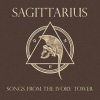Sagittarius, "Songs from the Ivory Tower"
 It’s hard to believe maybe, but Cornelius Waldner of Sagittarius started out his musical career playing in a black metal band, Hailstorm. Like many in that genre, he has felt the need to explore other avenues of musical expression and Sagittarius is one such exploration. Songs from the Ivory Tower is essentially the first proper release on a big label from him, delivering fifteen songs showcasing his quietly melancholic, small-scale songs and neo-classical instrumentals.
It’s hard to believe maybe, but Cornelius Waldner of Sagittarius started out his musical career playing in a black metal band, Hailstorm. Like many in that genre, he has felt the need to explore other avenues of musical expression and Sagittarius is one such exploration. Songs from the Ivory Tower is essentially the first proper release on a big label from him, delivering fifteen songs showcasing his quietly melancholic, small-scale songs and neo-classical instrumentals.
Songs from the Ivory Tower is an entirely appropriate title for this disc. It is an extremely introspective and reflective album, portraying a distinctly solipsistic ‘ivory tower’ insularity and isolationist vibe. Above all, this broadcasts a feeling that the artist has secreted himself away from the prying eyes of the corrupt modern world for a very long time, and has developed some circular mental pre-occupations as a consequence. Despite that and the closed-in feeling of the songs, it nevertheless possesses an icy beauty along with a sense of mystical detachment and nostalgia.
Piano, acoustic guitar, and strings form the main musical accompaniment, along with the occasional bit of flute. The songs, which are based on the work of the poets Stefan George, Bernhard von Uxkull-Gyllenband, Gottfried Benn, Ludwig Uhland, and Timo Kölling, are slow sorrowful reflections, akin to looking into a still black pool of water, and are sung in a mixture of English and German. As can sometimes happen in real-life, the thoughts expressed here, born in isolation, have closed in on themselves. I often felt a sense of tight claustrophobia creeping in, and significantly, the repetitive nature of some of the instrumental lines, rather than detracting (or being distracting), further enhance the feeling. Additionally, it underlines the circularity and restricted orbits of the songs.
The production is excellent, investing the songs with lushness while at the same time keeping the sparseness very much to the fore. Songs such as the plaintive piano and guitar opener “Nihil Arisen,” the simple musical scaffolding emphasising the philosophical despair in Waldner’s voice, definitely benefit from the Spartan approach. The same can be said for the short “Der sommer, den die erntezeit gekrönt,” lone piano chasing Waldner’s German-sung paean. The anger is barely contained, bubbling broodingly just below the surface. The simplicity underlines that emotion far more effectively than any amount of bombast could. Moreover, the whole album is heavily informed with that species of dark and heavily brooding emotion, hanging over it like thick black thunder- and rain-laden clouds.
Meanwhile, the instrumentals display a broad Germanic classical influence, especially in “Menuet von Johann Krieger (für H.E.R.R),” a piece which wears its 18th century chamber music stylings proudly. The ensuing track, “Cupio Dissolvi,” is a stately waltz of neo-classicism, sweeping and swirling around a be-columned ballroom. Perhaps this classicism is yet another expression of the hermit-like mind, a yearning for things past simply because they are somehow deemed to be better. Concomitantly I felt a strong infusion of nostalgia pervading this album, lending a distant and lost loneliness entirely befitting the delivery and style of the music.
I have a love/hate relationship with the neofolk/neoclassical genre, however this example shines through on many levels. While it is very introspective and very inward-looking, there are enough chinks in it that allow for more than a glimpse of the nostalgic world that Waldner inhabits. Make no mistake about this, there is a sepia-tinted nostalgia present here. The instrumentals reminded me somewhat of Bad Neuschwanstein in Bavaria for example, the fantasy castle of the Dream King, Ludwid König, with its hint of an aristocracy on the way down. However, even without the instrumentals, there is still a sense of years past, that somehow the modern day has lost its direction. It’s an emotion that many in these troubled times can identify with.
Samples:



